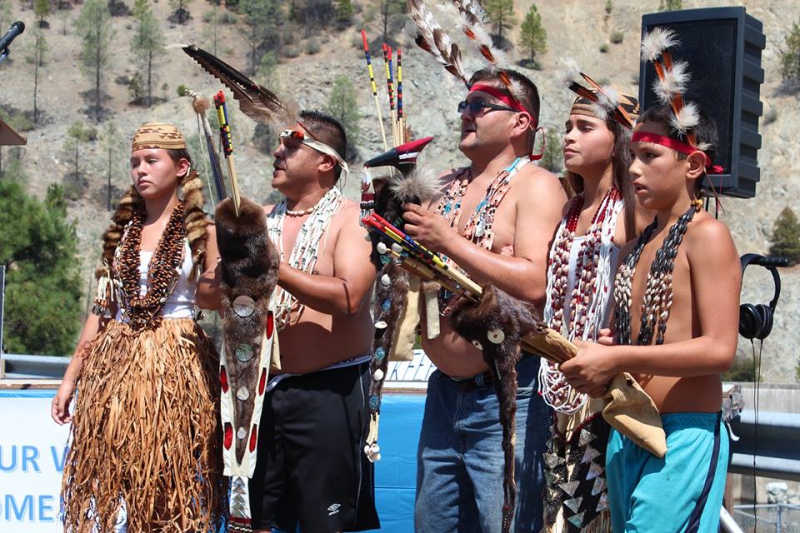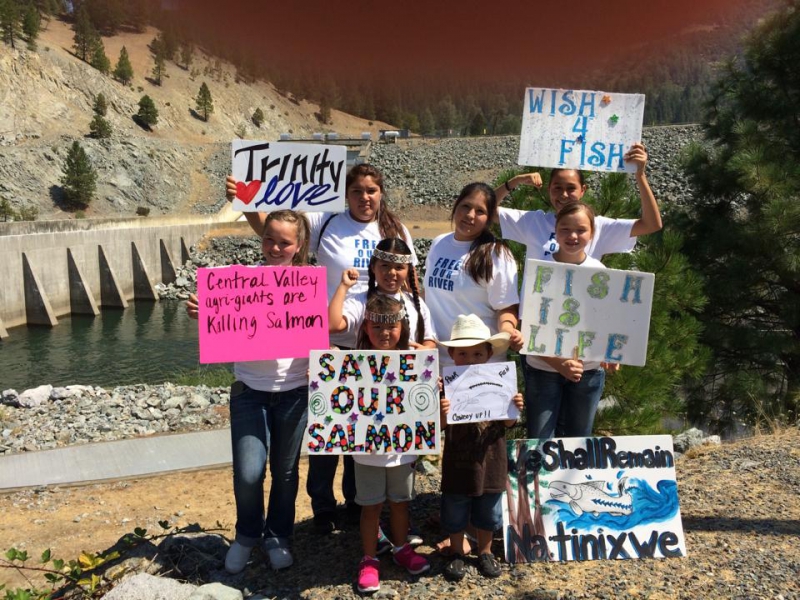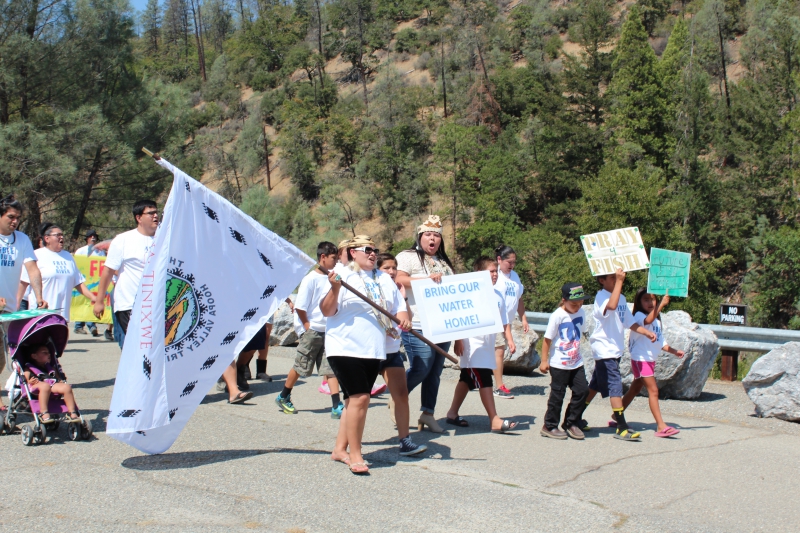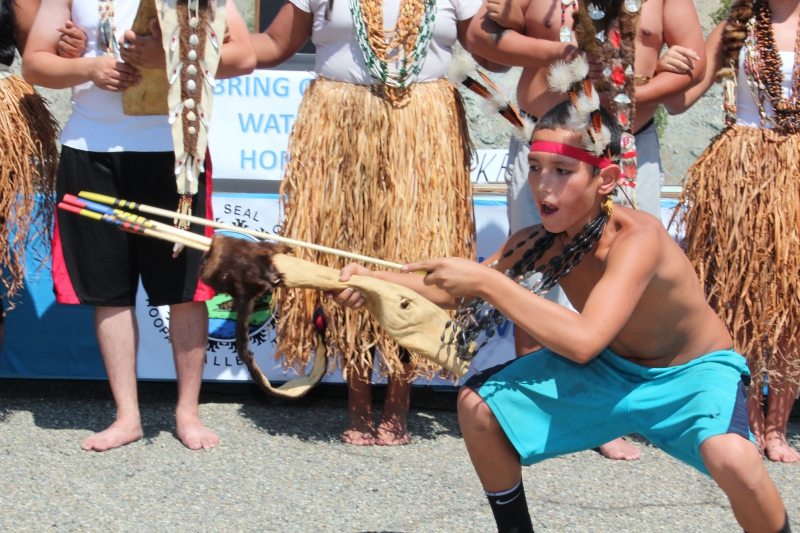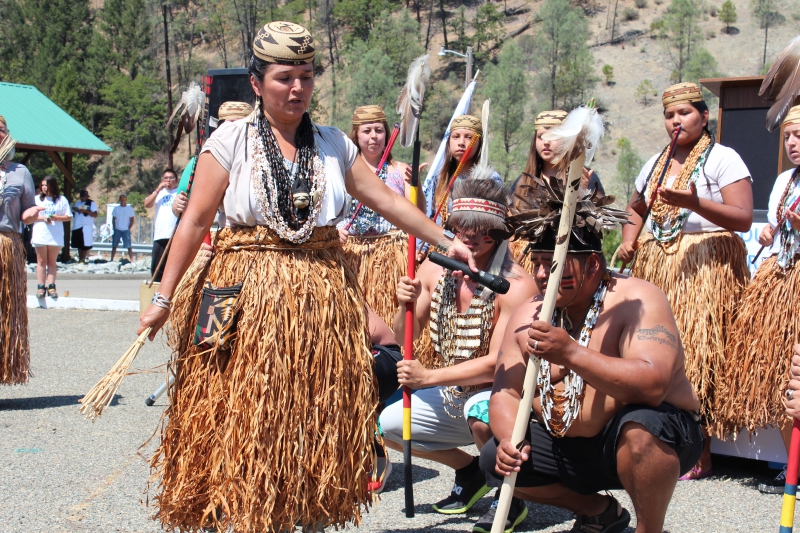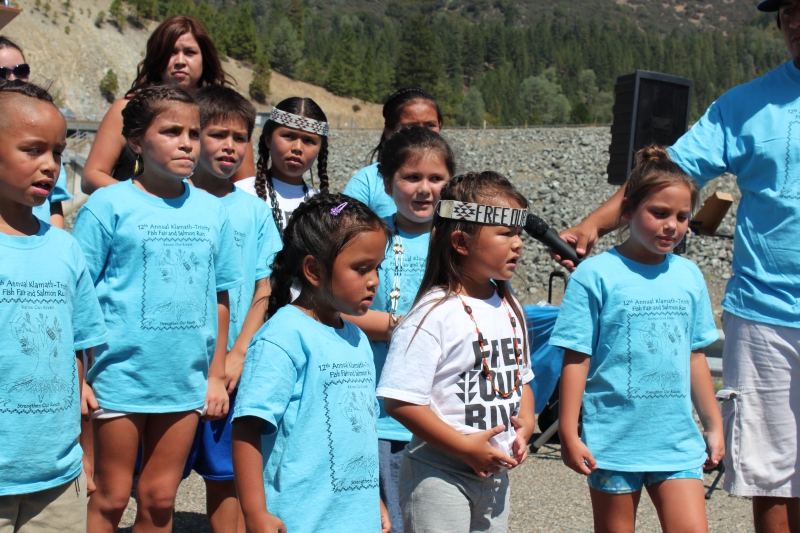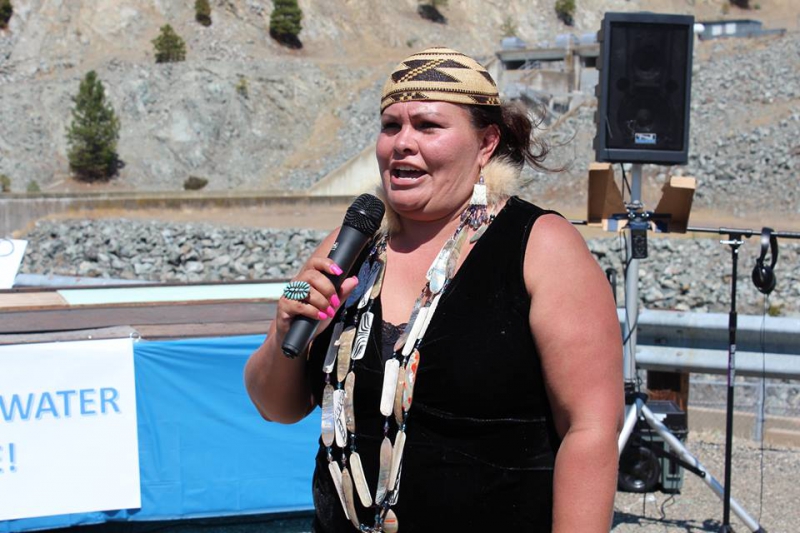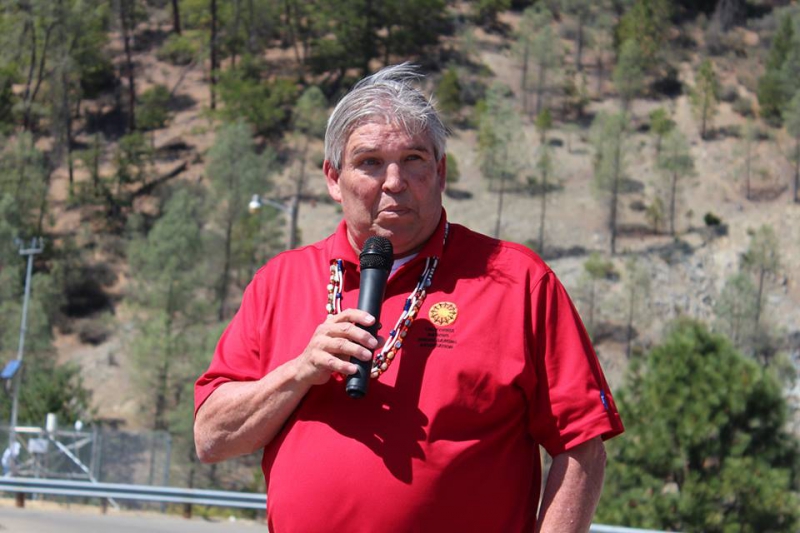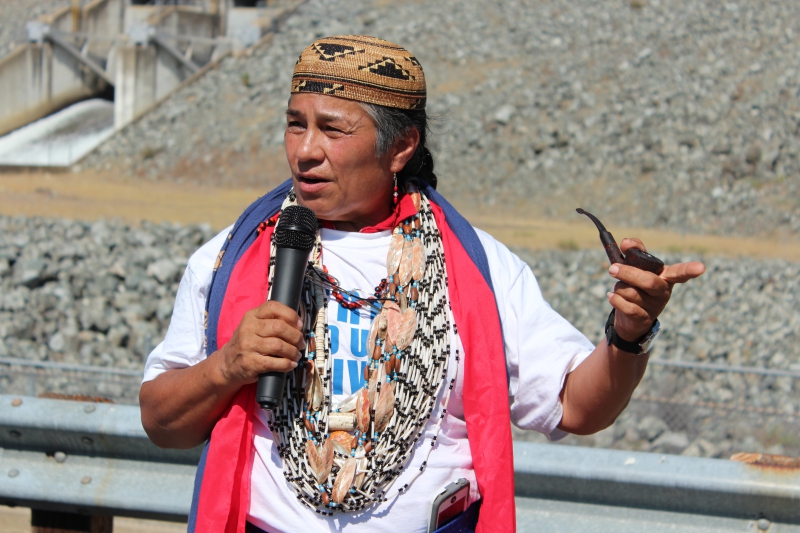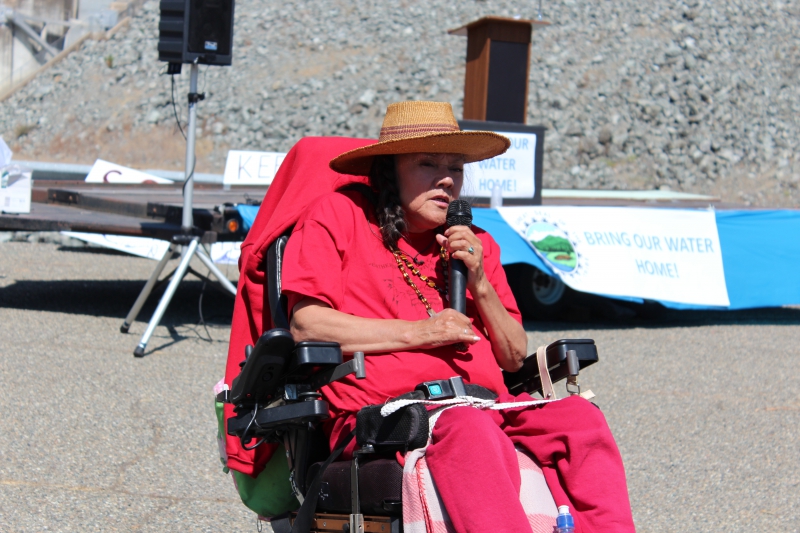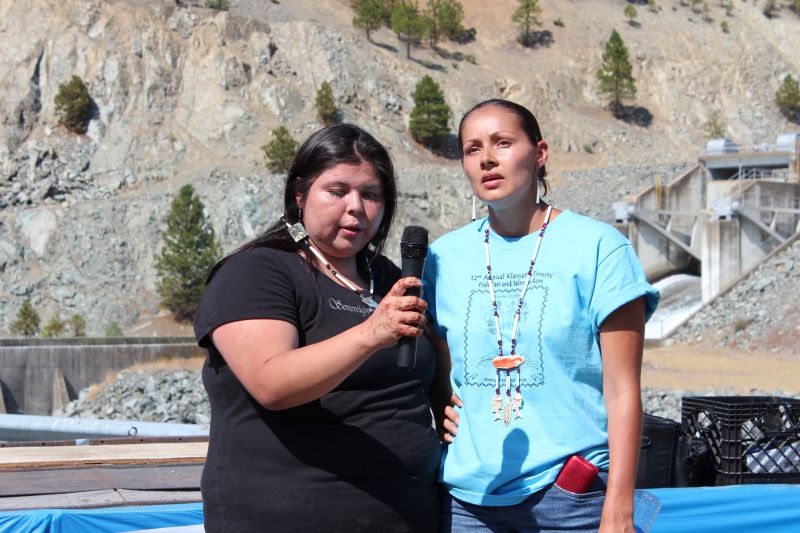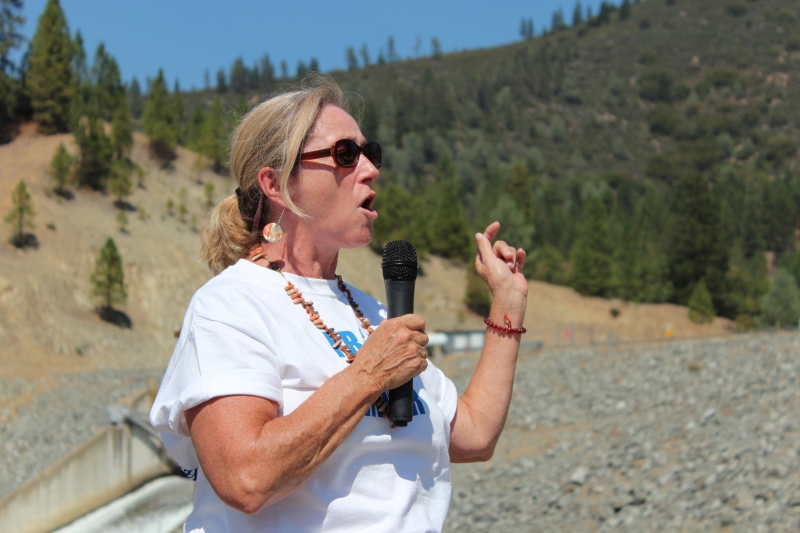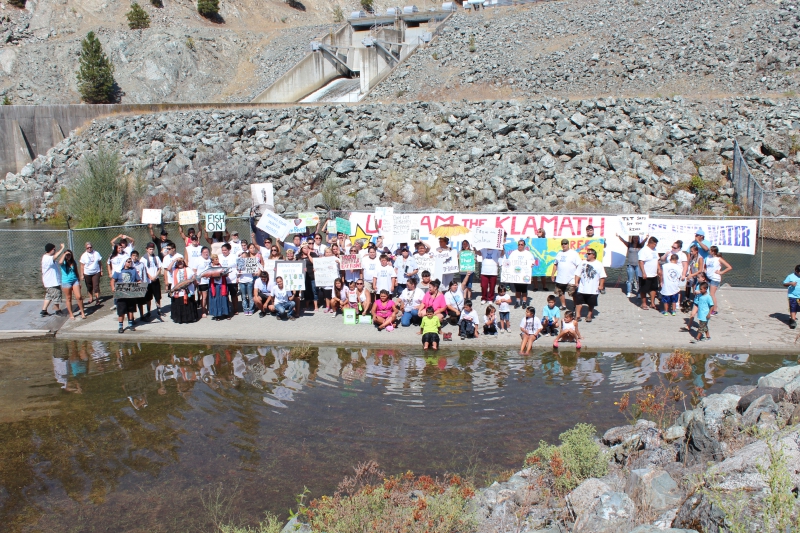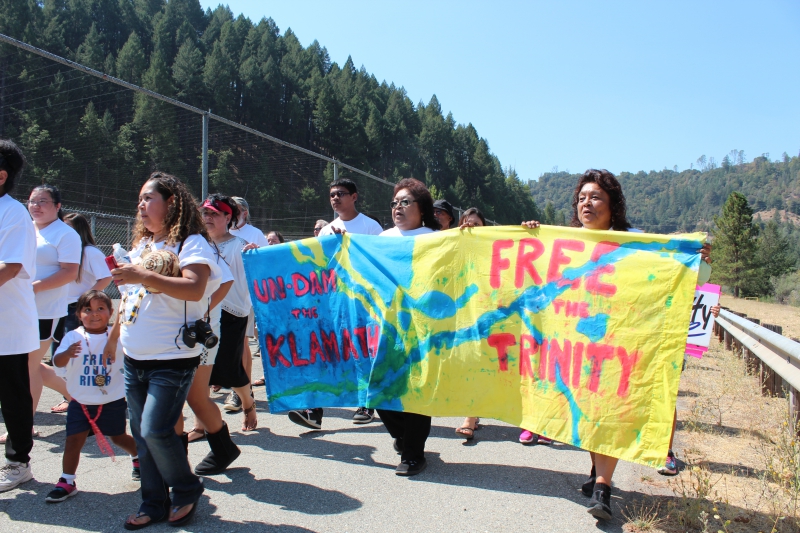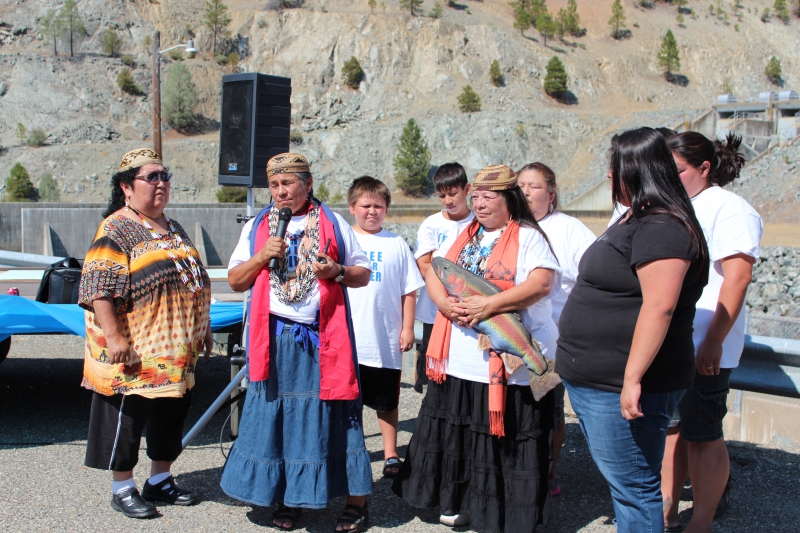From the Open-Publishing Calendar
From the Open-Publishing Newswire
Indybay Feature
Water Warriors Rally at Trinity River Fish Hatchery
After the rally ended, Tribal members received the great news that a federal judge in Fresno that afternoon had rejected a motion by San Joaquin Valley agribusiness interests to block the increased flows being released from Lewiston Dam to avert a fish kill on the Klamath River.
Photo of a traditional Hoopa/Yurok/Karuk Brush dance demonstration at the celebration at the Lewiston Fish Hatchery on August 27. Photo by Dan Bacher.
Photo of a traditional Hoopa/Yurok/Karuk Brush dance demonstration at the celebration at the Lewiston Fish Hatchery on August 27. Photo by Dan Bacher.
Water Warriors Rally at Trinity River Fish Hatchery
By Dan Bacher
On a very hot day, August 27, over 200 Tribal Members and Leaders, river advocates and politicians attended a day of celebration on the Trinity River below Lewiston Dam.
It was a day that the Bureau of Reclamation designated as a “Multicultural Day,“ so the Hoopa Valley Tribe organized an event to demonstrate the impacts of water diversion on their culture and the river communities.
It was also a day for giving thanks and celebrating culture and tradition. Tribal Officials talked of a sense of relief for having water flowing in decent amounts down the Trinity River, providing cooler water for spawning salmon to make their epic journeys back to the places of their birth.
The celebration took place next to the fish hatchery where Chinook and coho salmon and steelhead are spawned and reared by the California Department of Fish and Wildlife. Not lost on those present was the significance of that choice: a fish hatchery, a place of birth and release, something the Tribes have been doing for centuries.
The event began right before noon when the “Water Warriors,” those who have protested in defense of the Trinity in recent weeks, walked from the gate at the entrance into the hatchery where they convened at a stage. The “Water Warriors” wore t-shirts donated by Hoopa Valley Tribal Fisheries with “Free Our River” emblazoned on the front and carried an array of signs and colorful banners.
Members of the Yurok, Hoopa Valley and Karuk tribes, as well as leaders of the Winnemem Wintu Tribe, displayed signs and banners with slogans including “Fish Need Water,” “Let The River Flow,” "Give Us Our Water, " "Save The Salmon," "Tribal Rights Are Non Negotiable," "Release The Dam Water," "Undam the Klamath - Free the Trinity," "Central Valley agri-giants are killing salmon", "Fish Can't Swim In Money," and "Westlands Sucks The Trinity Dry."
Many of those “Water Warriors” had participated in a direct action protest at the Bureau of Reclamation Offices in Sacramento the week before, organized by the Klamath Justice Coalition and Got Water?, that helped pressure Reclamation to increase releases into the Trinity River below the dam to avert a fish kill on the lower Klamath, (http://www.indybay.org/newsitems/2014/08/20/18760371.php)
The opening walk was in honor of the Water Warriors’ “strong battle to preserve and protect our sovereignty, water rights, and salmon,” according to Hoopa Tribal Chairwoman Danielle Vigil-Masten.
After a welcome address by Bob Burns, Vice-Chair of Nor Rel Muk Wintu Nation, tribal members conducted traditional dance and singing demonstrations.These included a traditional Hoopa/Yurok/Karuk Brush dance demonstration by Boyd Ferris and Clarence Hostler Sr.
Hoopa Tribal Member sisters Kee-yah and Kisdyante Joseph sang a powerful water song, followed by a beautiful Flower Dance demonstration and “Water is Life” connection story led by Melody George-Moore.
After a prepared barbecued lunch where the Hoopa Valley Youth Council served the elders, teachers and students in the NDN Hupa Language Program presented their “Youth Water Songs for Healing.”
Hoopa Valley Tribal Fisheries Hydrologist Robert Franklin provided a detailed update on water flows, fish health and legal proceedings.
Hoopa Tribal Chairwoman, Danielle Vigil-Masten then reviewed the recent campaign by grassroots tribal and environmental activists that culminated in the victory, emphasizing the need for unity among the tribes and other river people fighting for the restoration of the Trinity.
“This rally today brings all the Water Warriors together to show them we have a united front,” she said. “This all happened within a two week time frame. We were able to bring the tribes and river people together from the dam to the mouth.”
"Water is our lifeblood – without water we won’t have salmon,” she said.
She emphasized that everybody should be “proud of who you are. Don’t put each other down – lift each other up!”
“Our fish need water to live and survive,” she emphasized. “Two weeks ago the Bureau said they couldn’t allow increased releases down the river, even though fish were dying. We called our Sister, the Chief of the Winnemem Wintu, to do the fire and water dance. We called everybody and said we can’t fight this battle with egos – we have to be united.”
Vigil-Masten said the high river releases from the dam that splashed into the air behind her were the result of a recent visit to Redding by Secretary of the Interior Sally Jewel. After finding out about the visit the night before, Hoopa tribal members including Dania Colegrove, Vivienna Orcutt and Allie Hostler and river activists including Regina Chichizola and Stormy Salamander quickly mobilized to organize a protest in Redding where Jewell was meeting with local officials about the fires.
Fortunately, Vigil-Masten and other tribal members were able to talk to her. “We had one shot to do this – and we showed up! The most important thing is showing up,” she emphasized.
Two days after Jewell’s visit, members of her staff traveled out to the Klamath and Trinity rivers to see the reality of the situation, with fish dying and the waters choked with algae in sections.
Buster Attebury, Karuk Tribal Chairman, also emphasized the need for unity in working to bring back the salmon to the Klamath and Trinity rivers.
“If we work together, we can accomplish a lot,” said Attebury. “We have different ways of doing things, but we are stronger if we stick together.”
He pointed out the irony of how fish ladders were constructed on the Pacific Corp dams in Oregon, but not below Iron Gate Dam in California. For over 70 years, Iron Gate has blocked salmon from ascending the Klamath River and its tributaries to spawn.
“What we want is a brighter future, “ he said. “We lived in harmony with the environment for generations. This is not an inferior way of life, as the settlers said. Only in the short time the settlers came to the region they raped the earth. THAT is an inferior lifestyle.”
Jeannie McCovey, Yurok Tribal Member, said state and federal authorities are "not managing the river properly. We’re dealing with ecocide... We have to fight for our air, water and land.”
McCovey urged people to fight for the river and salmon with every avenue available, including going to protests and hearings, writing letters and “folding hands in prayer. Humans are the only ones that can pray.”
Debra Chapman, Trinity County Supervisor, said, “We were bracing for another catastrophic die-off” before the Bureau decided to release water.
She talked about how when she was in high school, her mentor was a teacher who taught an environmental conservation class. In 1973, they put up a sign in Douglas City, “Entering the Trinity River. Studied to death and mismanaged to death.”
"Over forty years later we still have a problem with flows on the Trinity River," she stated.
“They treat the Trinity as if it is a tributary of the Sacramento. The Trinity is not a tributary of the Sacramento,” she emphasized.
Caleen Sisk, Chief and Spiritual Leader of the Winnemem Wintu Tribe, who gave the final prayer and song, emphasized, “We are a salmon state, not a watermelon or pistachio state. It will take Indian people all over the state to bring the salmon back.”
“We are one of a handful willing to speak for the salmon. We have to speak up, to support one another… Make sure that we carry the salmon in our hearts so we know what to say. If you’re on a tribal council, please speak up,” she said.
Other speakers and performers at the event included Miss Natini-xwe’ Kayla Brown, Hoopa Valley Tribe Member, who sang the Salmon Prayer Song, Rick Dowd, Resighini Rancheria Tribal Chairman, and Brian Person, U.S. Bureau of Reclamation Area Manager.
After the rally ended, Tribal members got word that a federal judge in Fresno that afternoon had rejected a motion by San Joaquin Valley agribusiness interests to block preventative water releases to avert a fish kill on the Klamath River.
U.S. District Judge Lawrence J. O'Neill denied the temporary restraining order (TRO) sought by Westlands Water and the San Luis and Delta-Mendota Water Authority after the U.S. Bureau of Reclamation increased releases on the Trinity River below Lewiston Dam on Saturday, August 23.
O’Neill ruled that potential harm to salmon facing low and warm water conditions at this time outweighs the potential harm to irrigators, who receive Trinity River water through the Central Valley Project, next year. For more information on the decision, go to: http://www.indybay.org/newsitems/2014/08/28/18760861.php
Statement By Hoopa's Negotiation Team On Court Decision:
Below is the statement from the Hoopa Valley Tribe’s Negotiation Team on the recent court decision by Judge Lawrence J. O’Neill:
"At issue is water in a Trinity River reservoir, which has long been shared with farmers in the Central Valley. The river is the main tributary of the Klamath River, where sharing scarce water between fish and farms has long been a tough balancing act marked by lawsuits and political battles for local tribe's that have been fighting for years to keep river flows at healthy levels for fish," Hoopa Tribal Fisheries Director Mike Orcutt said, "We're happy and thankful that the Court did the right thing this year. The Court is interpreting what the law says, which is, the assurances given to the residents of the basin including the Hoopa Tribe. That water would be used first and foremost here to protect the fish in the Klamath and Trinity river, not all of these other things that the Trinity River water is being used for in the Central Valley."
In the response to the TRO (Temporary Restraining Order), the court mentions only one argument - the trust responsibility to manage the project for the trust assets.
Councilman Ryan Jackson stated, "The release of the additional water into the Klamath Basin is a victory for Indian people and preservation of the Indian trust resource. However we shouldn't lose sight of how we managed to get to where we are today. The BOR continues to manage the Klamath basin in a irresponsible manner. Maximum deliveries of water out of the basin and into the California Central Valley continue to put a strain on an already stressed situation. The biggest problem we see is within the Klamath River and the over allocation of water to upper basin junior interest irrigators. This requires the BOR to rely on Trinity River water to bail out the Lower Klamath. Now we find ourselves in a lawsuit trying to defend an action that shouldn't have occurred in the first place. The basin needs to be managed responsibly or we will inevitably see a catastrophe in the basin that is entirely avoidable."
By Dan Bacher
On a very hot day, August 27, over 200 Tribal Members and Leaders, river advocates and politicians attended a day of celebration on the Trinity River below Lewiston Dam.
It was a day that the Bureau of Reclamation designated as a “Multicultural Day,“ so the Hoopa Valley Tribe organized an event to demonstrate the impacts of water diversion on their culture and the river communities.
It was also a day for giving thanks and celebrating culture and tradition. Tribal Officials talked of a sense of relief for having water flowing in decent amounts down the Trinity River, providing cooler water for spawning salmon to make their epic journeys back to the places of their birth.
The celebration took place next to the fish hatchery where Chinook and coho salmon and steelhead are spawned and reared by the California Department of Fish and Wildlife. Not lost on those present was the significance of that choice: a fish hatchery, a place of birth and release, something the Tribes have been doing for centuries.
The event began right before noon when the “Water Warriors,” those who have protested in defense of the Trinity in recent weeks, walked from the gate at the entrance into the hatchery where they convened at a stage. The “Water Warriors” wore t-shirts donated by Hoopa Valley Tribal Fisheries with “Free Our River” emblazoned on the front and carried an array of signs and colorful banners.
Members of the Yurok, Hoopa Valley and Karuk tribes, as well as leaders of the Winnemem Wintu Tribe, displayed signs and banners with slogans including “Fish Need Water,” “Let The River Flow,” "Give Us Our Water, " "Save The Salmon," "Tribal Rights Are Non Negotiable," "Release The Dam Water," "Undam the Klamath - Free the Trinity," "Central Valley agri-giants are killing salmon", "Fish Can't Swim In Money," and "Westlands Sucks The Trinity Dry."
Many of those “Water Warriors” had participated in a direct action protest at the Bureau of Reclamation Offices in Sacramento the week before, organized by the Klamath Justice Coalition and Got Water?, that helped pressure Reclamation to increase releases into the Trinity River below the dam to avert a fish kill on the lower Klamath, (http://www.indybay.org/newsitems/2014/08/20/18760371.php)
The opening walk was in honor of the Water Warriors’ “strong battle to preserve and protect our sovereignty, water rights, and salmon,” according to Hoopa Tribal Chairwoman Danielle Vigil-Masten.
After a welcome address by Bob Burns, Vice-Chair of Nor Rel Muk Wintu Nation, tribal members conducted traditional dance and singing demonstrations.These included a traditional Hoopa/Yurok/Karuk Brush dance demonstration by Boyd Ferris and Clarence Hostler Sr.
Hoopa Tribal Member sisters Kee-yah and Kisdyante Joseph sang a powerful water song, followed by a beautiful Flower Dance demonstration and “Water is Life” connection story led by Melody George-Moore.
After a prepared barbecued lunch where the Hoopa Valley Youth Council served the elders, teachers and students in the NDN Hupa Language Program presented their “Youth Water Songs for Healing.”
Hoopa Valley Tribal Fisheries Hydrologist Robert Franklin provided a detailed update on water flows, fish health and legal proceedings.
Hoopa Tribal Chairwoman, Danielle Vigil-Masten then reviewed the recent campaign by grassroots tribal and environmental activists that culminated in the victory, emphasizing the need for unity among the tribes and other river people fighting for the restoration of the Trinity.
“This rally today brings all the Water Warriors together to show them we have a united front,” she said. “This all happened within a two week time frame. We were able to bring the tribes and river people together from the dam to the mouth.”
"Water is our lifeblood – without water we won’t have salmon,” she said.
She emphasized that everybody should be “proud of who you are. Don’t put each other down – lift each other up!”
“Our fish need water to live and survive,” she emphasized. “Two weeks ago the Bureau said they couldn’t allow increased releases down the river, even though fish were dying. We called our Sister, the Chief of the Winnemem Wintu, to do the fire and water dance. We called everybody and said we can’t fight this battle with egos – we have to be united.”
Vigil-Masten said the high river releases from the dam that splashed into the air behind her were the result of a recent visit to Redding by Secretary of the Interior Sally Jewel. After finding out about the visit the night before, Hoopa tribal members including Dania Colegrove, Vivienna Orcutt and Allie Hostler and river activists including Regina Chichizola and Stormy Salamander quickly mobilized to organize a protest in Redding where Jewell was meeting with local officials about the fires.
Fortunately, Vigil-Masten and other tribal members were able to talk to her. “We had one shot to do this – and we showed up! The most important thing is showing up,” she emphasized.
Two days after Jewell’s visit, members of her staff traveled out to the Klamath and Trinity rivers to see the reality of the situation, with fish dying and the waters choked with algae in sections.
Buster Attebury, Karuk Tribal Chairman, also emphasized the need for unity in working to bring back the salmon to the Klamath and Trinity rivers.
“If we work together, we can accomplish a lot,” said Attebury. “We have different ways of doing things, but we are stronger if we stick together.”
He pointed out the irony of how fish ladders were constructed on the Pacific Corp dams in Oregon, but not below Iron Gate Dam in California. For over 70 years, Iron Gate has blocked salmon from ascending the Klamath River and its tributaries to spawn.
“What we want is a brighter future, “ he said. “We lived in harmony with the environment for generations. This is not an inferior way of life, as the settlers said. Only in the short time the settlers came to the region they raped the earth. THAT is an inferior lifestyle.”
Jeannie McCovey, Yurok Tribal Member, said state and federal authorities are "not managing the river properly. We’re dealing with ecocide... We have to fight for our air, water and land.”
McCovey urged people to fight for the river and salmon with every avenue available, including going to protests and hearings, writing letters and “folding hands in prayer. Humans are the only ones that can pray.”
Debra Chapman, Trinity County Supervisor, said, “We were bracing for another catastrophic die-off” before the Bureau decided to release water.
She talked about how when she was in high school, her mentor was a teacher who taught an environmental conservation class. In 1973, they put up a sign in Douglas City, “Entering the Trinity River. Studied to death and mismanaged to death.”
"Over forty years later we still have a problem with flows on the Trinity River," she stated.
“They treat the Trinity as if it is a tributary of the Sacramento. The Trinity is not a tributary of the Sacramento,” she emphasized.
Caleen Sisk, Chief and Spiritual Leader of the Winnemem Wintu Tribe, who gave the final prayer and song, emphasized, “We are a salmon state, not a watermelon or pistachio state. It will take Indian people all over the state to bring the salmon back.”
“We are one of a handful willing to speak for the salmon. We have to speak up, to support one another… Make sure that we carry the salmon in our hearts so we know what to say. If you’re on a tribal council, please speak up,” she said.
Other speakers and performers at the event included Miss Natini-xwe’ Kayla Brown, Hoopa Valley Tribe Member, who sang the Salmon Prayer Song, Rick Dowd, Resighini Rancheria Tribal Chairman, and Brian Person, U.S. Bureau of Reclamation Area Manager.
After the rally ended, Tribal members got word that a federal judge in Fresno that afternoon had rejected a motion by San Joaquin Valley agribusiness interests to block preventative water releases to avert a fish kill on the Klamath River.
U.S. District Judge Lawrence J. O'Neill denied the temporary restraining order (TRO) sought by Westlands Water and the San Luis and Delta-Mendota Water Authority after the U.S. Bureau of Reclamation increased releases on the Trinity River below Lewiston Dam on Saturday, August 23.
O’Neill ruled that potential harm to salmon facing low and warm water conditions at this time outweighs the potential harm to irrigators, who receive Trinity River water through the Central Valley Project, next year. For more information on the decision, go to: http://www.indybay.org/newsitems/2014/08/28/18760861.php
Statement By Hoopa's Negotiation Team On Court Decision:
Below is the statement from the Hoopa Valley Tribe’s Negotiation Team on the recent court decision by Judge Lawrence J. O’Neill:
"At issue is water in a Trinity River reservoir, which has long been shared with farmers in the Central Valley. The river is the main tributary of the Klamath River, where sharing scarce water between fish and farms has long been a tough balancing act marked by lawsuits and political battles for local tribe's that have been fighting for years to keep river flows at healthy levels for fish," Hoopa Tribal Fisheries Director Mike Orcutt said, "We're happy and thankful that the Court did the right thing this year. The Court is interpreting what the law says, which is, the assurances given to the residents of the basin including the Hoopa Tribe. That water would be used first and foremost here to protect the fish in the Klamath and Trinity river, not all of these other things that the Trinity River water is being used for in the Central Valley."
In the response to the TRO (Temporary Restraining Order), the court mentions only one argument - the trust responsibility to manage the project for the trust assets.
Councilman Ryan Jackson stated, "The release of the additional water into the Klamath Basin is a victory for Indian people and preservation of the Indian trust resource. However we shouldn't lose sight of how we managed to get to where we are today. The BOR continues to manage the Klamath basin in a irresponsible manner. Maximum deliveries of water out of the basin and into the California Central Valley continue to put a strain on an already stressed situation. The biggest problem we see is within the Klamath River and the over allocation of water to upper basin junior interest irrigators. This requires the BOR to rely on Trinity River water to bail out the Lower Klamath. Now we find ourselves in a lawsuit trying to defend an action that shouldn't have occurred in the first place. The basin needs to be managed responsibly or we will inevitably see a catastrophe in the basin that is entirely avoidable."
Add Your Comments
We are 100% volunteer and depend on your participation to sustain our efforts!
Get Involved
If you'd like to help with maintaining or developing the website, contact us.
Publish
Publish your stories and upcoming events on Indybay.
Topics
More
Search Indybay's Archives
Advanced Search
►
▼
IMC Network


